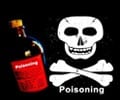Environmental authorities blamed a smelter for the poisoning of over 600 children in north China after the air near the plant was found to contain high lead levels, state media said Sunday.
"A smelter is mainly to blame for lead poisoning that sickened 615 kids in... Shaanxi province," the official Xinhua news agency reported.Quoting Han Qinyou, head of the an environmental protection monitoring station where the smelter is located, the report said officials collected 69 samples of groundwater, surface water, soil, air and sewage in the area.
"The results show that the groundwater, surface water, soil and the company's waste discharge have all met the national standards," Han was quoted as saying.
"But lead content in the air along the main roads near the company is 6.3 times that of the monitoring sites 350 metres away from the roads."
Tests have shown that at least 615 children out of 731 living in two villages near the Dongling Lead and Zinc Smelting Co plant in Changqing township in Shaanxi had excessive lead levels in their blood.
A total of 166 were hospitalised while the rest are to be treated at home to rid their bodies of the excess lead, the report said.
Advertisement
Above 200 milligrams is considered hazardous, with children more vulnerable to lead poisoning which can harm the nervous system.
Advertisement
Zhao Weiping, vice Communist Party secretary of the Dongling group, apologised to local residents, the report said.
"We will cooperate with the government to treat the sickened children and improve our work in light of the requirements of environment authorities," he was quoted as saying.
Many poverty-stricken regions in China's interior have introduced high-polluting industries without the necessary environmental evaluation, in a desperate bid to boost economic growth, state media has said.
Source-AFP
LIN











